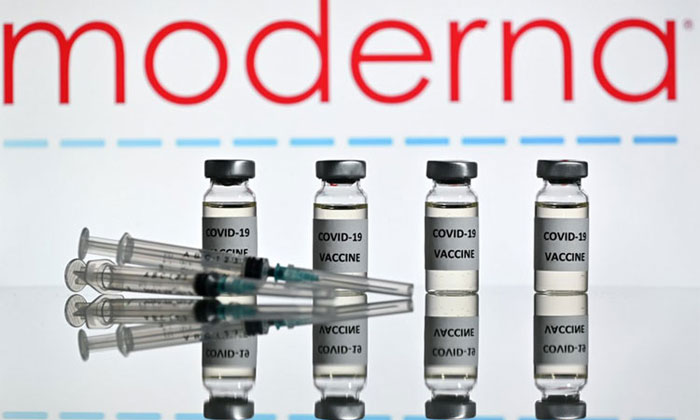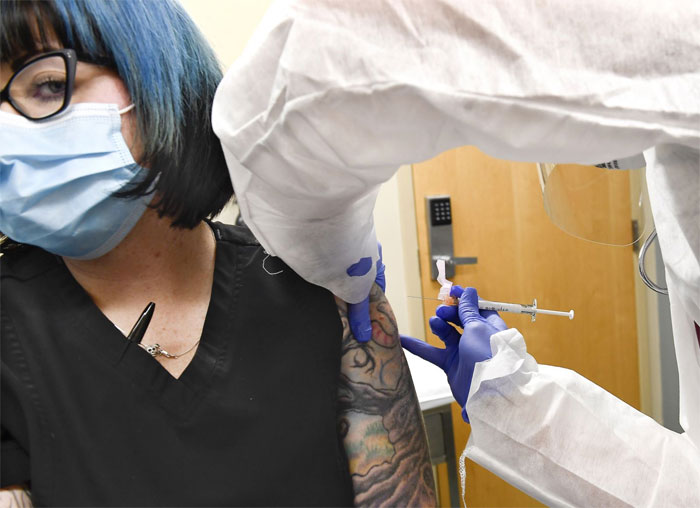How Moderna designed a breakthrough Covid-19 vaccine in just 2 days?
Moderna's Covid-19 vaccine is 95% effective in preventing disease, but what's more impressive is that the company designed its vaccine in just two days in January 2020.
Moderna's vaccine candidate was announced to be 94.5% effective in preventing Covid-19 in clinical trials. The company's vaccine development process has been incredibly fast – and only Pfizer and BioNTech's team has beaten the newcomer by announcing late-stage trial results days earlier.
Moderna's experimental vaccine ended up being much more effective than expected. The US Food and Drug Administration (FDA) had previously said it was likely to approve a vaccine that was at least 50% effective, while Dr. Anthony Fauci, the US's top infectious disease expert, said he hoped for 70% effectiveness.

Moderna designed its vaccine candidate in just two days in January 2020. (Photo: AFP/TTXVN).
But perhaps most impressively, Moderna designed its vaccine candidate in just two days in January 2020, before many people had even heard of Covid-19.
That would be impossible without relying on the technology that Moderna has been betting its life on since the company was founded: the development of messenger RNA (mRNA) vaccines.
mRNA is a genetic material that tells cells how to make proteins. Moderna's covid vaccine candidate works by injecting a small piece of mRNA from the SARS-CoV-2 virus, which has been coded for the virus's spike protein. This protein helps the virus attach to and invade cells, and it's what antibodies target to neutralize it. Moderna 's mRNA vaccine prompts the body to produce the spike protein itself, thereby triggering an immune response to prevent the disease.
Pfizer's vaccine candidate, which is claimed to be 95% effective, also works based on mRNA technology.

An American volunteer is injected with Moderna's experimental Covid-19 vaccine on July 27, 2020. (Photo: AP).
Using mRNA vaccine technology means Pfizer and Moderna only need the genetic sequence of the SARS-CoV-2 virus to create their vaccine. There is no live virus to grow in a lab, which is why they can do this in record time. With traditional vaccine platforms, by contrast, this process can take years.
Bob Langer, one of the founding members of Moderna, told Business Insider: 'What you can do is turn this technology into a completely new way of making drugs, vaccines, almost anything.'
The FDA has never approved a vaccine or treatment based on mRNA technology, so Moderna's gamble seems risky. But it also seems set up to pay off. Moderna said it will soon ask the FDA to authorize the vaccine for emergency use.
If the FDA backs that proposal, mRNA vaccines would usher in a new industry standard.
How does Moderna 'get ahead' of the virus?
On January 6, 2020, Moderna CEO Stéphane Bancel emailed Barney Graham, a vaccine researcher at the US National Institutes of Health (NIH). Bancel was troubled by a mysterious virus outbreak in Wuhan, and he approached Graham about the idea of developing a vaccine for the virus.
Moderna has been working with the NIH on vaccine development since 2017, but they don't have a vaccine approved yet. And Graham agreed.
On January 11, Chinese researchers published the genetic sequence of the SARS-CoV-2 virus, which causes Covid-19. Two days later, a team from Moderna and NIH scientists completed the target gene sequence for use in a vaccine.
By February 24, Moderna had shipped the first batch of its vaccine to a team of NIH scientists in Bethesda, Maryland. Researchers administered the first experimental dose on March 16 in Seattle, Washington. That injection also opened the world's first clinical trial of a Covid-19 vaccine.

mRNA vaccines offer a big advantage: speed.
Moderna's lightning speed may have raised some concerns about whether the company has sacrificed caution. But that's not a concern, says Albert Rizzo, chief medical officer of the American Lung Association. "We haven't skipped a step, we actually have better technology ," Rizzo says. "Why did it take two weeks to cross the Atlantic in the 1800s? We had to go by boat. Now we can cross the ocean in a matter of hours."
Advantages and disadvantages of mRNA vaccines
For decades, vaccines contained either a dead or weakened version of the virus. Then, advances in early genetics allowed vaccines to use proteins from the virus, rather than the virus itself. This approach was first used in the 1980s to develop a vaccine for hepatitis B.
Companies like Novavax are using protein models to develop vaccine candidates. But Moderna has been working exclusively on mRNA technology since it started in 2010.

Illustration of a coronavirus molecule. The red dots are the spike proteins. (Photo: CDC).
One big advantage of mRNA vaccines is speed. Because they are made in test tubes rather than grown in cells, they can be produced much more quickly.
But vaccines based on this technology still have drawbacks. For example, they require two shots. Pfizer's vaccine requires two shots three weeks apart, while Moderna's candidate requires two shots four weeks apart.
mRNA vaccines are also difficult to transport and store. Pfizer's vaccine needs to be kept at -70 degrees Celsius during transport, requiring specialized refrigerators and dry ice. Moderna's vaccine requires storage at -20 degrees Fahrenheit, just a little colder than a regular freezer.
Thanks to positive developments in the development of the COVID vaccine, Moderna's market capitalization has increased by over 400% since January 2020, to over $40 billion.
- 'Error' discovered in Moderna, Pfizer Covid vaccines: What does science say?
- Vietnam is about to test the vaccine against Covid-19 in humans
- Breakthrough prize of 3 million USD for mRNA technology to create Covid-19 vaccine
- New vaccine can neutralize Covid-19 strains
- The new cancer vaccine has just been injected into the first patient in the United States
- AstraZeneca announced the reason for recalling COVID-19 vaccine
- The Covid-19 vaccine is ready for testing, not yet available
- Cancer can be cured with AstraZeneca's Covid-19 vaccine technology
- Found the reason why AstraZeneca vaccine causes blood clots
- The first experimental Covid-19 vaccine produced antibodies
- Using a method different from traditional, the US company announced that it had found a vaccine for Covid-19
- With this game, you can help find the vaccine against Covid-19
 March 2012: Launching H5N1 vaccine for poultry
March 2012: Launching H5N1 vaccine for poultry Experts comment on the mysterious gradual disappearance of the Delta variant in Japan
Experts comment on the mysterious gradual disappearance of the Delta variant in Japan Danger of the two Delta . branch variants
Danger of the two Delta . branch variants 2020 pandemic flu attack humans?
2020 pandemic flu attack humans?